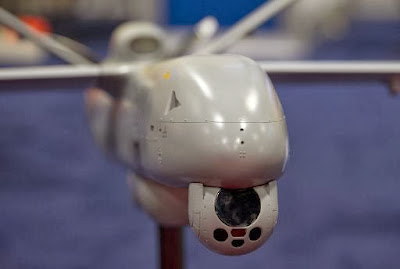Google – AFP, 30 December 2013
Washington
— US aviation regulators on Monday released the names of sites picked to test
civilian drones whose slated 2015 debut over American skies has sparked privacy
concerns.
Testing of
the unmanned aircraft is due to start within three months and could continue
until February 2017, the Federal Aviation Administration (FAA) said in a
statement.
The FAA has
said some 7,500 small unmanned aircraft can be expected in US airspace in the
next five years -- provided regulations are in place to handle them.
As well as
law enforcement, supporters say civilian drones could be used for a vast range
of applications, including tracking the progress of wildfires, helping to find
lost skiers, identifying criminals or mapping inhospitable terrain.
 |
This photo
released by Amazon on Dec.1,
2013 shows a flying "octocopter"
mini-drone
that would be used to fly small packages
to consumers
(Amazon/AFP/File)
|
Operators
include the University of Alaska, whose winning proposal covers seven climatic
zones and foresees testing in the states of Hawaii and Oregon.
The state
of Nevada will, among other things, focus on how air traffic control procedures
will evolve with the introduction of drones.
New York's
Griffiss International Airport, meanwhile, will study the integration of drones
into the heavily frequented northeast airspace.
Another
chosen operator, the North Dakota Department of Commerce, is the only one to
offer testing in a temperate, continental climate and a variety of different
airspaces, according to the FAA.
Texas
A&M University-Corpus Christi plans to develop system safety requirements.
The sixth
operator, Virginia Polytechnic Institute and State University, known as
Virginia Tech, will conduct "failure mode testing," with sites in
both Virginia and New Jersey.
The FAA
said it had received 25 proposals from 24 states and made its selection
following a 10-month selection process.
It noted in
its announcement that, as laid out in November, test site operators must comply
with federal, state and other privacy laws and have a "written plan for
data use and retention."
Michael
Toscano, president and chief executive of the Association for Unmanned Vehicle
Systems International, representing drone makers, welcomed the FAA's
announcement, calling it "an important milestone on the path toward
unlocking the potential of unmanned aircraft."
According
to Toscano, the market for civilian drones will lead to the creation of 100,000
jobs over the first decade following their integration into US skies. That
would generate more than $82 billion, he said.
The
American Civil Liberties Union urged Congress to ensure the protection of
privacy.
"We're
pleased the FAA acknowledges the importance of safeguarding privacy in the
testing areas where drones will be flying, but requiring test sites to have
privacy policies is no guarantee that every site will put strong protections in
place," Catherine Crump, the group's staff attorney, said in a statement.
"Someday
drones will be commonplace in US skies and, before that happens, it's
imperative that Congress enact strong, nationwide privacy rules."
About 80
law enforcement agencies currently operate unmanned aircraft under special
authorization.
Earlier
this month, Amazon head Jeff Bezos floated a futuristic mini-drone delivery
plan that would drop small packages at doorsteps in just 30 minutes.







No comments:
Post a Comment